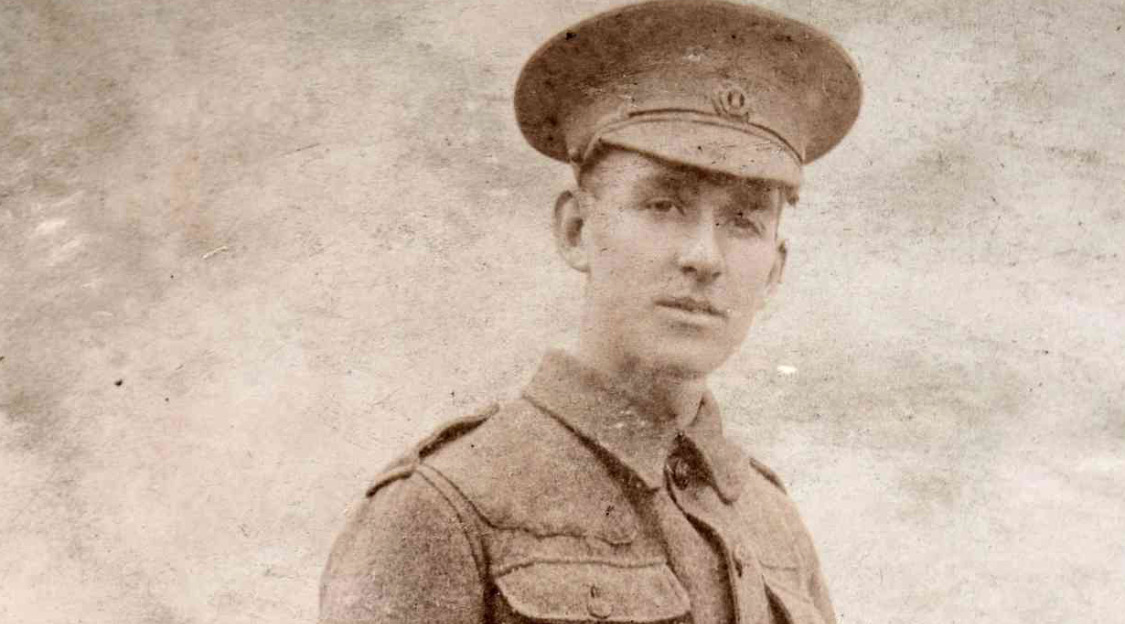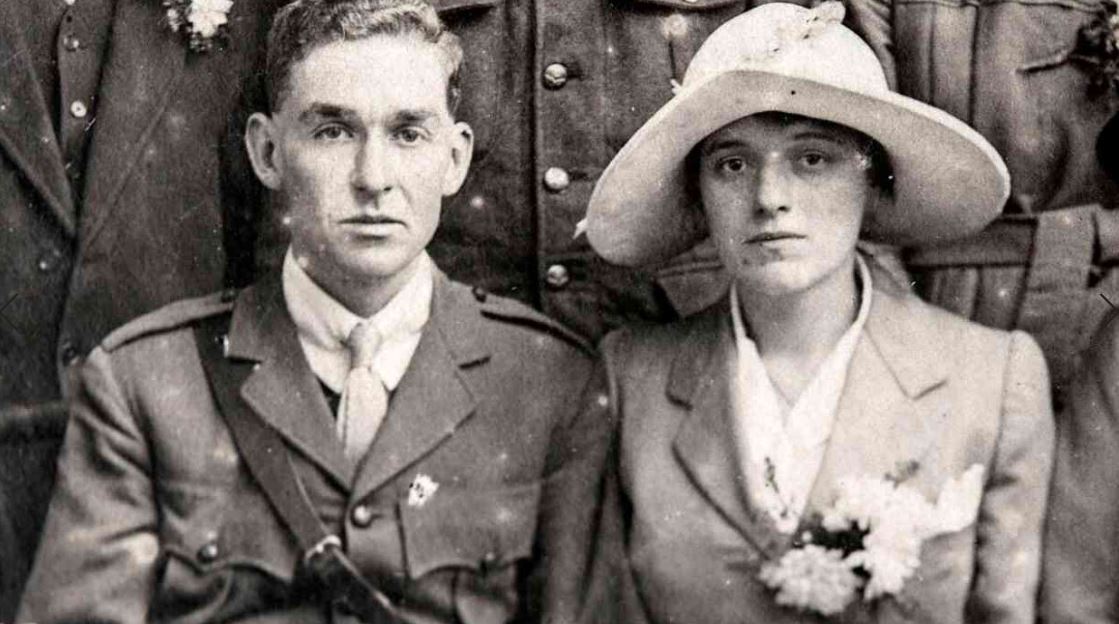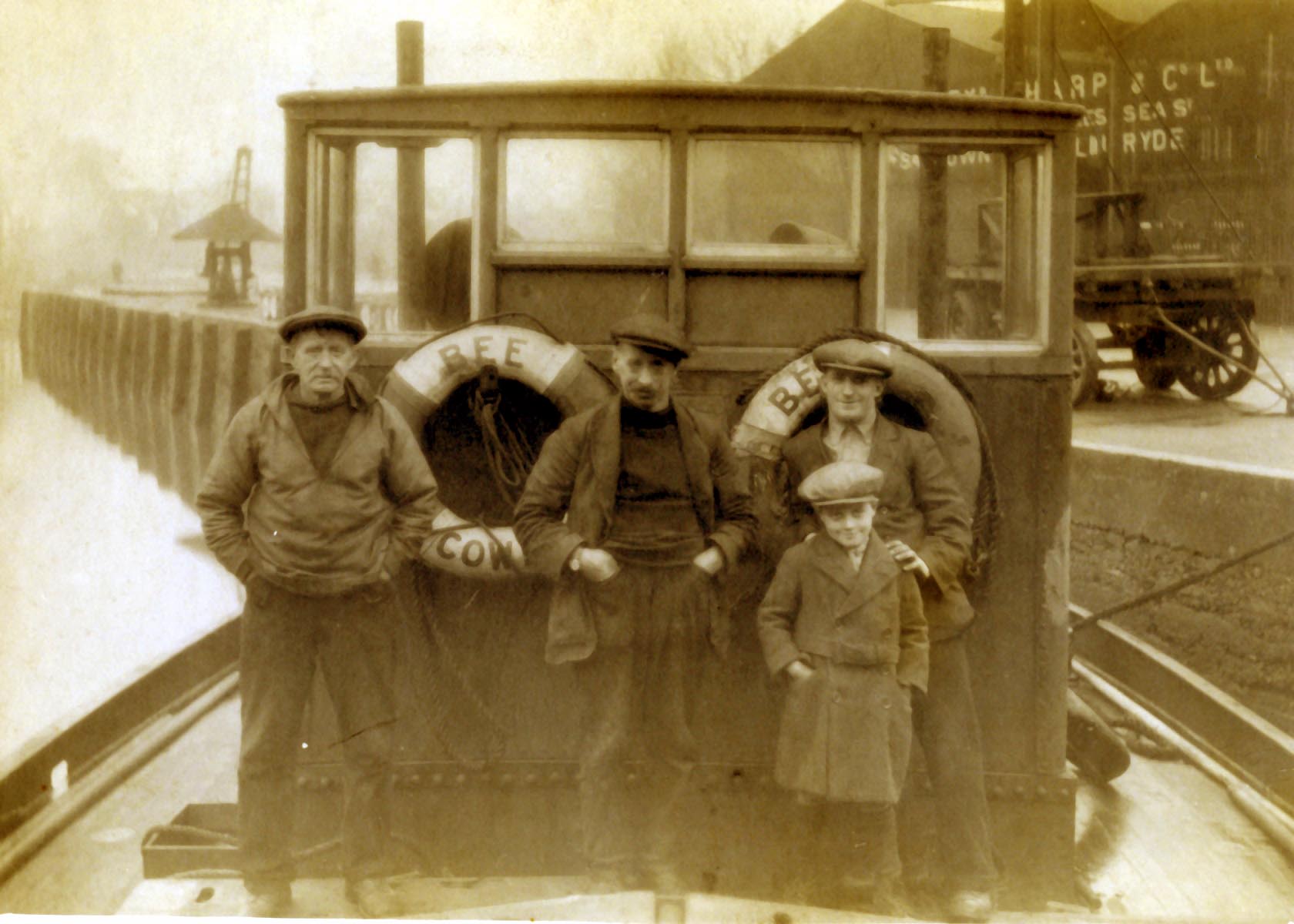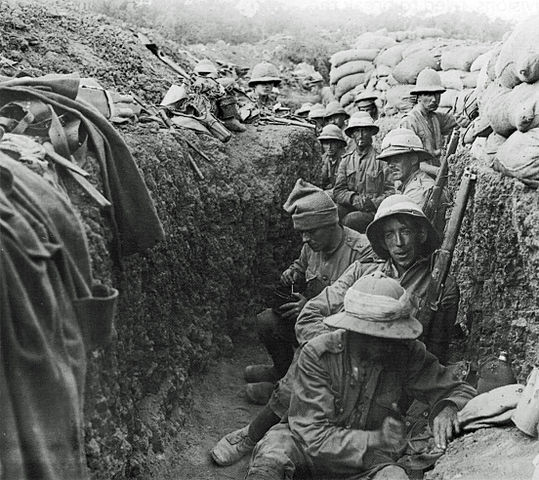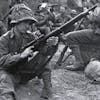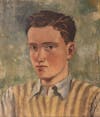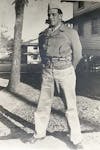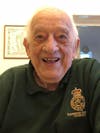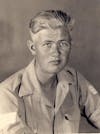16 Gallipoli Part 1. WW1 Memoirs of Sgt Fred Reynard
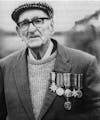
First hand account of the brutal fighting at Suvla Bay, Aug 15, WWI
A brutal, firsthand account of the savage WW1 battle of Gallipoli, written by Sergeant Fred Reynard of the Isle of Wight Rifles.
He landed at Suvla Bay in August 1915.
The allied troops fought for the strategic waters of the Dardanelles, and the Turkish capital city of Constantinople, in the Ottoman empire.
Would the brave but over-confident allies find they’d bitten off more than they could chew in the face of opposition from the equally brave, confident and well-prepared Turks?
"Then the firing stopped and with a yell of 'Allah, Allah' the Turks charged. They bore down on us like fiends, and soon I was fighting for my very life."

Fred Reynard, in later years, proudly showing off his Gallipoli medals

Useful WW1 Links from the show
Podcast - The Gallipoli Campaign by La Trobe university and Prof Robin Prior - Episode 13
Isle of Wight Rifles website - Fred's regiment
The diary entries of Lieutenant-Colonel Henry Jourdain, 5th Battalion The Connaught Rangers, describe the landings at Anzac Cove in August 1915
Best podcast for World War 2 history and the second world war
Interested in Bill Cheall's book? Link here for more information.
Fighting Through from Dunkirk to Hamburg, hardback, paperback and Kindle etc.
Fred Reynard WW1
Fred and wife Ada in 1919
Fred Reynard, below far left, looking like a man you shouldn't mess with, as the engineer on little ship the Bee after Dunkirk.
Map illustrating how the Dardanelles Straight gave access to the Sea of Marmara, which then led to the Black Sea and Russia. Mudros bay 2014 © Susan Burnett
Troops from the Royal Irish Fusiliers serving in Gallipoli in Autumn 1915 WW1
FT episode 16 - Gallipoli WW1 by Sergeant Fred Reynard - Part 1
More great unpublished history!
A complete unabridged memoir of the fierce World War 1 (WWI) battle of Gallipoli, written by Sergeant Fred Reynard from the Isle of Wight. He landed at Suvla Bay in August 1915.
This podcast episode is of special interest to people interested in the role of the indian army and ghurkas in WW1/WWI
In 1915, British, Australian, New Zealand and Indian Gurkha troops fought for the strategic waters of the Dardanelles, and the Turkish capital city of Constantinople, in the Ottoman empire.
A leaflet issued to troops advised, “Turkish soldiers as a rule manifest their desire to surrender by holding their rifle butt upward and by waving clothes or rags of any colour. An actual white flag should be regarded with the utmost suspicion as a Turkish soldier is unlikely to possess anything of that colour.”
Would the brave but over-confident allies find they’d bitten off more than they could chew in the face of opposition from the equally brave, confident and well-prepared Turks?
Then the firing stopped and with a yell of 'Allah, Allah' the Turks charged. They bore down on us like fiends, and soon I was fighting for my very life.
You’ll have come across stories from time to time of the discovery of an unknown Rembrandt painting or Beethoven symphony. Well, this has the same flavour in my mind. It’s never been published and only ever been read by half a dozen family and friends.
OK it wasn’t written by Winston Churchill or someone famous, but it was written by a man who after WWI would go on to distinguish himself further in WWII. That man is Fred Reynard. A man who fought in the thick of it, not someone who described the action from the side lines.
HELEN WESTBROOK
We have all heard about Fred in the little ship the Bee episode, when he played a stunning role in the evacuation of troops from the Dunkirk beaches in 1940. Well, shortly after that episode went out, I received an email from someone:
My name is Helen Westbrook, grand-daughter of the late Fred Reynard. My family, including my brother and sister, thoroughly enjoyed listening to Gramps’ fascinating story on your recent podcast. We all have fabulous memories of a wonderful man, who lived an amazingly full life. He also left another wonderful war diary from WW1 relaying his experiences from Gallipoli
Thank you so much,
Helen
I replied to Helen and she kindly sent me her grandad’s wonderful memoir. So after much scanning and typing and editing, it’s finally in shape for the show. And it’s so long I’ve made two episodes out of it so
I’m releasing them separately but I won’t keep you waiting too long to hear part 2.
But not only did Helen send me Fred’s WW1 Gallipoli story, she also sent me an extended version of the WWII Dunkirk little ship Bee memoir he wrote, so that too is going to be featured in a forthcoming show, especially given the huge interest recently generated by the new Dunkirk Movie. This is 2017
RITA COOPER
Before I get onto Fred, I want to share some feedback from Rita Cooper about John Smith’s poetry in the last show …
Wow, Paul,
My granddaughter and I listened to your podcast and it was absolutely fantastic. I’ve never heard anyone read Dad’s poems and you were just brilliant. It certainly made my eyes well up. Dad would’ve been proud of what you’ve written and spoken about him.
I called my brother John in the USA and told him to listen to the podcast and also my daughter who framed the embroidery, told her to have tissues handy.
Just brilliant Paul.
Thank you so much.
Rita
Thanks for the feedback Rita – it’s lovely to be able to share your reaction with other listeners and I’m pleased my efforts were appreciated
Rita, you should know your Dad’s poetry has gone down a storm and at the time of recording it’s had about 2000 listens and counting! So thanks again to you for taking the trouble to send it all in.
I’ve started to put links to Amazon for certain books I mention in my show. If you buy anything, I do receive a small commission which goes towards the costs of the show, but I would stress you do not pay any more for this, and I’ll only place links to books I’d personally recommend after having read them myself.
BACKGROUND
Here’s the background to Fred’s story:
The Gallipoli Campaign of WW1 took place on the Gallipoli peninsula in Turkey between 25 April 1915 and 9 January 1916, some eight months. So it was quite an tough, drawn out campaign comprising of a great series of battles.
The peninsula forms one bank of the Dardanelles, a narrow sea route to the Russian Empire, which was one of the Allies during WW1.
An early naval campaign to defeat the peninsula failed, and the land campaign started on 25 April, involving British, French, Australian and NZ troops (the Anzacs). The strategy for the campaign was to cross the peninsula and capture the forts and gun emplacements which threatened the passage of allied shipping through the Dardanelles straight.
The aim was the capture of the Ottoman capital of Constantinople
(now Istanbul) thus securing the waters of the Dardanelles and opening up a short cut shipping route to Russia.
Fred joined the Campaign later on in the August when the Allies were putting together a concerted effort to overcome some earlier difficulties which had been experienced during the first landings back in April.
If you’d like to hear a podcast which offers a great overview of the campaign, I’d recommend Gallipoli and the Great War by La Trobe university. There’s a link in the show notes.
Map in show notes along with various other bits of info and photos at FTP. Hopefully also in the notes included with your listening App.
Of course, Gallipoli can’t be talked about without reference to the brave Australian and New Zealand forces and the Indian Gurkhas, all of who are given a great press by Fred for their massive contribution to the campaign.
But would the brave allies find they’d bitten off more than they could chew in the face of opposition from the equally brave Turks?
FRED
Fred came from the Isle Of Wight near Southampton on the south coast of England.
He was a sergeant in the 8th Battalion, The Hampshire Regiment, Princess Beatrice's Isle of Wight Rifles, which was part of the 163rd (Norfolk and Suffolk) Infantry Brigade of 54th (East Anglian) Division the British Army. The brigade landed at Suvla Bay, Gallipoli, on 10 August 1915 when Fred was aged 22.
THE WW1 MEMOIR
9th of August 1915 – Four months in [to the WW1 battle of Gallipoli]
We dropped anchor in Mudros Bay [On the Greek, Lemnos Island] as the sun came up. Six and a half days out of Liverpool, and I was tired. Being a Machine Gun Sergeant, and having a gun mounted on the bridge, entailed extra duties, and from the Irish Channel until we’d arrived at the Greek Island it was continuous watch for U-Boats or surface raiders. Still, here we were, with eight thousand men and two thousand tons of shells, safe and sound, with visions of a good look round, and a sound night's sleep.
We soon had a great shock and the vision of sightseeing and rest soon vanished, for after two hours, the SS Faunette came alongside and 2000 of us tumbled aboard. At 2.30pm we sailed again with the blazing sun making the sweat pour from us, everyone guessing where, but no information forthcoming as to our destination. So we steamed in the heat and into the cool of the evening, and at 10pm we knew, for we were in the Sea of Marmora and we were going to Gallipoli, well known to everyone, as the 'Peninsula of Death'. This to me was not a happy thought, for I’d read a good deal of the Turks, both as a fighter, and as an interner of prisoners, and of the land where we were going, but this was the task allotted to us, and as there were no back doors, we’d to make the best of it. We reached our destination at midnight, but we’d not dropped anchor, we just steamed around slowly watched by a screen of HM Destroyers.
Dark shadows of other ships were arriving, until the sea was dotted with black spots made visible by the half moon. There was a strange silence aboard. Would someone tell us something to ease our feelings? Then the fall in for a meal, and this to be followed by an address by the C.O. Then we knew what we had to do, for we were to force a landing at dawn in a few hours' time, a landing at Suvla Bay.
We assembled between decks for a church service, a very impressive one, the usual army hymns, Onward Christian Solders etc. and concluding with Abide with Me. This was the last service that almost half the assembled would ever hear on earth again, but no one seemed morbid about it for nobody knew.
The landings were to take place as follows: Our brigade, the 163, was to land at Suvla. The 162 to follow us in as support, and the 161 to pass through us and dig in, then the 163 and 162 would go forward and take the village of Anafasta (on paper as good as done). The French and two naval divisions - Drake and Anson to land at Cape Helles.
The Australia and New Zealand 32 Divisons would go ashore at Anzac, while the 36 Irish Divison would go in at Salt Lake. This operation involved 61,000 men. The layout was sound for those who planned the operation, but what they did not take into account was that the Turks had had six months to prepare for us, and they’d certainly made the best of their time.
The lads stood about in little groups; for some having their last chance of a chat with their pals. My pal was a lad from Wootton, near Bedford, Dink Watson by name, and we made our arrangements what to do in the event either going under. A good lad was Dink. The hour arrived, then the first order. “Over the side you go”, and soon hundreds of dark shadows were making their way down ladders into small boats the Navy had placed alongside.
"Full up sir", a midshipman shouted, then, “Away you go”, the answer came and I found myself in one of a string of boats being towed ashore by a naval pinnace. Sometimes straight, sometimes in a bow. We went skimming over the water, the dark outline of the shore began to show up, and nothing happened. We were to make a landing undetected I thought, but I thought too soon. Another 50 yards then hell let loose.
A hail of machine gun and rifle fire swept through us. Men slumped across the oars, for the pinnace had slipped us. Now it was a case of every boat for itself. The Turks had placed barbed wire just under the water and boats stuck fast and its men soon wiped out. My boat was lucky to find a gap through which we passed to the beach and we scrambled out.
Our machine guns were to follow us in after a landing was made, so I had my section with just rifles. Other boats were getting through, and I gathered my section, I had only lost two, and sheltered behind some rocks, until we could establish a line to go forward. Then the firing stopped and with a yell of 'Allah, Allah' the Turks charged. They bore down on us like fiends, and soon I was fighting for my very life.
Three more of my section fell, never to rise. We fought like tigers - sword, butt, and everything.
I found myself in an uncomfortable position but Dink Watson was there to save me.
Once my sword jammed tight in a Turk's equipment and I was disarmed.
I was kicked in the shins and went down, a big Turk trying to gouge my eyes out.
Then a limp body fell across me, and Dink had again saved my life.
Thrust and counter thrust, kill or be killed.
Another rifle was thrust into my hand, and the fight swayed both ways but all the time more were getting ashore for the 162 brigade were landing.
Then he [the enemy] started to retire and at the same time his shells started to rain. High Explosives (HE's) and shrapnel took a heavy toll of life and the orders came along to dig in. Small entrenching tools were all we had, and the ground was rock, so all we could do was to get what shelter we could until a line was established. We’d gone inland about 500 yards, and the shore was strewn with dead and wounded. Then some order was restored and we got down in earnest.
The line began to take shape, the wounded cared for and as many as possible of the dead that could be, buried in a mass grave on the shore for here was the only ground that was soft enough to dig.
The build-up continued, and our ships engaged his batteries and so eased his shelling of us. To our right and on our left flank, the battles were waging with a frightening din. How they were faring we didn’t know, but there was certainly plenty of action.
Our machine guns came ashore and we felt more at home, and the supplies of food and equipment were being landed by the navy in great amounts. But the main Turkish force had gone back on our section - but why? Well, we were to find out before many days were passed, for Johnny Turk didn’t give much away.
It seemed that the attack on Anafasta was off for the present. I thought had we gone on we should have done better, but there were others with more brains running the show, so what we thought didn’t count even if we dare to say it. Still, the fact remained, there we were on a hostile shore, under a burning sun with no shelter, not much water or food and weary and tired after hand to hand fighting, waiting to see what was going to happen next. WW1 podcast continued
Night fell and double sentries watched, while men rested. More stores came ashore, and men and material, but during the hours of darkness snipers returned and these men began to take a steady toll of life. As day broke a salvo of shells fell among the landing parties, just one salvo, but what damage it did. It caught a number of mules with their Indian drivers and we could ill afford to lose them. Still we were at war, and could expect anything. The day wore on and the heat of the sun increased, men were tortured with thirst, one sip was all one could offer just to moisten their lips.
Then came some orders. We would advance at 4.00pm and take Anafasta. Somehow we welcomed that order, for we were too many in too small a space to suit me. Anafasta was a village roughly three miles N.W. of our position. It was on the side of a not too steep hill, but between us and that hill was about two miles of flat plain land which we would have to cross. It just meant that as soon as we started to move forward, we should be in full view of the Turks.
We started on time and what a show. The sun shone on our bayonets and he knew everything we were doing. Then he started, HE's, shrapnel, Wiz Bangs, field guns, and big stuff from the forts at the Narrows he threw at us [the Narrows, is a narrow section of the Dardanelles waterway.]
Large gaps were torn in our ranks but we’d to go on. Before we’d gone half a mile, my gun section with the exception of my pal Dink, my No. 1 and myself were either dead or wounded. I carried the gun of 56lbs in hand but with the heat of battle one didn’t notice the weight. Men were lying everywhere, but you couldn’t stop to attend the wounded. Get on was the order and get on we did. Soon we found ourselves in range of his small arms and machine guns and then we were forced to move with more caution.
At the bottom of the slope of the hill was a small wood of olive trees and into there our advanced troops entered. Then we found out why he’d retired, for the wood was a mass of well-built trenches with slits to fire through and with underground tunnels running through the hill. We were led and nicely led into a trap. Snipers were everywhere and the small arms fire intense. The least movement was spotted and men dropped like flies from this hidden foe. Nothing for it but to dig in. I drew men from the company nearby to help with my gun emplacement and we dug like fury.
Night fell and we still dug in. He eased his small arms firing but the snipers were still there, and one could hear the cry of one who was hit, but we had to prepare for a counter attack, we were sure would come. The moon gave a good light so I had to acquaint myself as much as possible with my surroundings, to get the best possible effect with my gun.
I had to crawl out to a small ridge and I saw an opening from the wood. I saw also over the crest and about a quarter of a mile off, a sunken road, along which a convoy of traffic was moving towards where the Australian and New Zealand line were attacking.
I returned to my position and set my gun for the gap in the wood and then I met Capt Holmes Gore. He’d rounded up stragglers and had collected the ammunition boxes the men of my section were carrying when they fell, and this was to prove very useful in the near future. I asked how the battalion had fared and he said badly, in fact no contact could be made with any who had entered the wood, also the 4th and 5th Norfolks had simply disappeared. These were men from the Sandringham Estate and a fine lot of lads they were. I reported what I had seen and he said it would reach the right quarters.
Capt Holmes Gore also told me that Capt Loader was killed and that there were only seven officers at Headquarters that could be accounted for. He said, “My definite orders to you, Sergeant, are to hold on whatever happens, for there must be no retirement.” I knew what I had to do, and I intended to do it, but it meant that every round fired would have to count.
The night pressed on and there was a strange quiet. No one could afford to relax their watch, and then I heard a movement and saw the outline of a figure coming down the line towards our position. He stopped and spoke to the lads on the way and this was followed by a movement of the men. When he reached my position he said, “Are you with the Hampshires?” I said, "No" (a lie). He then said, I am Capt Loader of the Hampshires, the only officer left, prepare to retire at once. I knew Capt Loader. I knew he was dead, and I knew there must be no retirement. He guessed my thoughts and his hand flew to his side, but he was too late, I fired and he was dead.
We dragged him into the gun position and looked him over. There was nothing in the dress or even features to say he wasn’t British and I began to wonder. Then Dink said, nice watch Sergeant, and it was, a gold watch inscribed within, with words I could not read. Yes, he was a Turk.
I sent a runner down the lane to stop those who were thinking of retirement and contacted H.Q. Then we dragged Johnny Turk clear of our emplacement and left him there to rot. The morning broke and still no sign of a counter attack. The sniping was resumed and claimed many lads. We dug still deeper and sappered off the position. [Listener this means the preparation of a position with trenches. And a sap was a position where the ground had been so sappered]
Then a tragic incident happened, one which was to prove a turning point in my army life. There was a cry of help from no man's land and turning round I saw a man running round in circles. He was either mad or blinded. It was the latter. But there was something else - a figure of a man running towards him and that man was Dink Watson. I saw Dink reach him and then he fell wounded himself. No time to think then, and I found myself running towards my pal. The fifty yards I must have covered in record time, but I reached him and he was still alive.
He said, "Sgt Freddie". Where my strength came from I shall never know, but I threw him over my shoulder, as if he was a child and started back with a hail of bullets following me.
Something hit my side and it pained a little; then a bang on the chest as I tumbled with Dink into our shelter. Dink was dead, and so we could do nothing for him, so I had to look to myself. A bullet had broken my bayonet off short and had driven the steel of the scabbard into my hip, tearing the flesh apart. Another had hit the prayer book I carried in my breast pocket, and the steel mirror inside had deflected it and so saved my life. And the mirror was one that Dink had given me. WW1 podcast continued
I was filled with remorse and sorrow, for I had lost a good pal but over his body I swore I would not rest until I had put that sniper in his grave or he mine.
That evening we dragged Dink's body to the shelter of a large olive tree where we buried him. The picture of his girl, I placed in his breast pocket and buried it with him. We recited the Lord's Prayer and heaped large stones to keep the carrion birds away. We marked his grave with a simple wooden cross made from an ammunition box, and marked it with just one word 'Dink' But I crawled away from that spot bitter in heart, it seemed to everything.
Capt Seely was waiting for me when I got back. He said that he’d seen everything and he would send his report to HQ.
But I only wanted that sniper.
I mentioned to Capt Seely what I had said to Capt Gore but he informed me that the Capt was gone, having never returned from a line tour. He said the Royal Engineers (RE) had established a line to us, so he could contact Brigade HQ and would report what I had seen.
Late afternoon, an officer of the Royal Field Artillary (RFA) came to us and with him we crawled to our ridge. I shall not forget his words when he looked on to that sunken road, "The dream of an RA officer," he said. The road was jammed with traffic moving toward the 32 Div sector - wagons, guns, troops etc - and we’d about a three mile view until they vanished from sight by a gap in the hill. In his excitement he jumped to his feet and was rewarded with two shots through his helmet, and I never saw a man move more quickly than he did.
But those shots had done something more, for there was not a breath of air, but I saw the leaves of a tree move. We got back nearly to our position and I put my helmet on a piece of stick and pushed it gently up. I didn’t have to wait for long, and it had a hole in it. But it was the same tree and I knew where my sniper was. I got back and the RA officer left me. I took every care with my gun and spaced the belt. I got the range and put a burst into that tree. The leaves and branches shattered but nothing else, so I tried another burst and a body came falling to the ground.
I waited until nightfall and went out to that body. The features were not course, as I expected to find but the skin was painted to suit the surroundings. There was a belt on the body severed by my bullets, but still in position, and then I made a discovery, for that sniper was a woman.
That discovery shocked me for I’d killed a woman, then I saw around her neck was a string of discs, 48 in all, of those she’d killed and five were men of my own battalion.
I thought of my pal Dink, forgot my scruples and cursed her as she lay there and went back. We were never troubled with a sniper at Anafasta again. The next day was fairly quiet, until 3pm, when the whine of a shell passed over our positions on its way to the Turks lines. Three more followed and then within minutes hell let loose.
Explosion followed explosion and the air about us was filled with the noise of shells of all sizes passing over. Yes, the Navy and our batteries had ranged the sunken road and were pounding it to pieces and when we viewed it after the guns had ceased, there was little of any use left to the Turks.
During the next few days there was nothing much to report on except a few raids. He seemed to have left the wood and its trenches and these were taken over by our brigade and this seemed to point to the fact that the naval divisions from Cape Helles had looked a danger to his rear.
I had instructions to remain where I was entrenched, as the view to the wood entrance could easily be covered by my gun and one from the Suffolks who formed part of our brigade. Rations came every night, carried by those faithful little Indian mules and by their equally faithful Indian drivers but water was very short in supply and the heat of the day was almost unbearable. Still, there we were and lucky to be alive.
Then I had a brain wave. The olive trees were green so they must have water. Could we find it was the question. On the maps, four wells were marked within a quarter mile from where we were, and we thought this would be our salvation. With the aid of my compass, and by section, we determined their position and that night the party set off to get the water which at that time was the lifeline of the army.
They found two wells and the first man drank
and within five minutes he was dead.
Yes, the Turks had all the answers, for all the wells were poisoned. This was a hard blow for everyone as on the strength of finding water, men had consumed more of their ration. Still, there would be nothing for it, but to await the next ration with the prospects of another hot day to endure before that could arrive.
The next day was hotter than ever and everyone felt the effect more but nothing happened but a little shelling and the cool of the evening was welcome. We settled down, as we thought, for another quiet night. Midnight passed and suddenly the night was lit up with a large star shell. This was quickly followed by another, and then it started. It sounded like the roll of a thousand drums as he put a barrage of shells down across that wood. Trees and trenches went sky high and men with them.
For over an hour, he sent everything he had, large and small, and the very earth seemed to rock with explosions. We had a few near misses and a few were hit where we were but it was the wood that had it. Suddenly the shelling stopped and there was a great yell as the Turks charged from behind the barrage. They came in swarms shouting and cursing us in broken English calling us infidels from the South Seas and from the accursed Britain.
They called to their Allah and shouted that they would drive us all into the sea, as they swarmed through that gap in the wood. Belt after belt I put through that gun.
His dead piled up but over the bodies they still came. Shouting and cursing. Still nearer they came. We fired point blank and they reach our trenches piling up their dead on the parapets and then they were among us and a free for all followed.
We fought with everything we had, butts, bayonets, entrenching tools, kill or be killed was again the order. We drove him into the saps we’d dug and a mills bomb sorted them out. Then a welcome cry from behind us and the little Gurkhas came. We didn’t not know they were about but we heard they’d come over from Lola Baba to our left. Their knives flashed out as they got among the Turks and the slaughter began. Slowly Johnny was forced back leaving only behind his dead and wounded.
By dawn it was all over. The Turks had retired and his wonderful army of 20,000 smashed. He’d lost nearly a quarter of his strength, between seven and eight thousand killed and wounded. For days after we could hear the screams of his wounded slowly dying out there from thirst and wounds. When there was a movement a merciful shot sent another son of Allah to his maker. Then we knew that the regiment we’d smashed was their famous 18th regiment under the command of Mustafa Kemal and he was disgraced forever by Enver Pasha [he was the War Minister and Ottoman Commander in Chief].
But we’d not got out of it scot free. Our losses were terrible and he took a large number of prisoners from the wood, where he hurried them through the tunnels and away. But although we retrieved the greater amount of our wounded, a number were left to perish in the wood he set on fire as he retreated. From then onward Gallipoli became an open graveyard. It stank, for friend and foe were there rotting in the sun. No one could relax, for loss of manpower meant extra duty. Men found the ever increasing nervous strain began to tell. Water was scarce and dysentery rife, septic sores, gnat bites and unclean ulcers that nothing seemed to heal didn’t help. The vultures became more numerous and daring. We could only watch them feed and it was a common sight to see men go about in bandages.
And then we got the news that we were to be relieved. At midnight our relief began to move in and us out. The 51st Highland Div relieved. That three miles back was the longest three miles I ever walked.
Lack of rest, food and water; plenty of sores to rub as you walked and with a 56lbs gun on your shoulder plus equipment etc;
Stumbling over shell holes and bodies tripping on barbed wire, moving fast so as not to lose sight of the file who was following a guide.
Slowing up when a convoy of mules going up with supplies were on the same track.
But [always] going back away from the hell we’d lived in. WW1 podcast continued
We reached Salt Lake and rested behind a small hill. How peaceful it seemed and the moon shining on the sea made it seem to us a new world. We slept until 10am and then had a meal and tea, the first tea since the landing. We then assembled for roll call and then came the shock. We’d landed 1,000 men and 21 officers. 139 answered the roll. Where were the others? Well - killed, wounded or prisoners.
I spent the day looking around trying to find my mates who I worked with down the quay. I found some, but ten - I never saw again. Well, as a fighting unit we were a write off for the present so after a couple of days we helped to unload stores the navy brought in. They’d built three small piers since we’d landed and that helped a lot, but I thought of what might have happened had we retired that night, for then he could have cut our forces in two and disrupted everyone's supplies. A fortnight passed and then new men arrived to swell our numbers. We stopped our work on the shore and prepared for a move. On late afternoon we began to move in Indian file in the direction of Lola Baba. We marched for an hour and then bore left through a valley named Chunuk Bair and then we entered a narrow trench leading up the line.
The trench was deep and flying traverses across it prevented observation from the hills. The front line was about half a mile ahead and we travelled slowly on without interruption. Soon the smell of death caught up with us, for we were getting near the end of our journey. Bodies appeared above us for the trenches were heaped up with the dead. An arm would swing out in your path as the bodies were swelling. You said cheerio to a hand and shook it and you were left with a handful of decomposed flesh. Large rats bit at you and the eyes of the dead seemed to look at you with maybe remorse or pity. ‘My God’, I thought, as I staggered on, under the weight of my gun. Then, without a warning, a Wiz Bang hit close, killing two lads ahead of me, another bang and I was fighting for breath and everything went black as night and I knew no more, for I was buried alive.
I opened my eyes and tried to think where I was. I was looking up at the stars and could see no one but I heard talking in a strange language. I went cold, had the Turks got me? Then a dark skinned man bent over me. “OK Sergeant”, he said, “Me Sergeant of Gurkhas, me get you drink.” He brought me water and then told me in good English that I was got out alive with one more man and the other gun I carried wedged across the trench and left an air pocket which saved us both. He said he was a machine gunner but they’d no gun, and he was to take me back to HQ when I was well. WW1 podcast continued
We went along and Dr Ramond gave me a pill and then I was supposed to be alright. I then had orders to take over the Gurkhas section of gunners and I would get orders later. My new friends had positioned the gun and they told me to rest. I found that with a white man they would stay and be contented but on their own they wouldn’t stay in a trench for long. I duly received my orders. For the next day on the 8th August an attempt was to be made to take Chunuk Bair or Chunuk Farm and we were to cover up if anything went wrong. The attack was planned for dawn.
About 4am on the 8th, our ships began an antenna bombardment and our troops moved forward. They advanced with deadly shells passing over them, as deadly a bombardment as I had heard out there and the Turks were driven back into that very spouting fire of our guns. The Warwicks and the Lancashires were in the vanguard of the attack, and they reached the crest of Chunuk. The little Gurkhas followed on, their knives flashing as the sun showed higher but this was too much for my gun section. A word from the Sergeant and they were gone, over the top, to join their fellow men, and I never saw them again.
How those men fought - they drove the Turks over the top and down the other side at the point of the bayonet and those gallant Lancashire and Warwickshire lads with their Ghurkha comrades saw the promised land across the Maidos Plain and the waters of the Narrows. Then the greatest tragedy of all. Those lads who had driven the Turks down the other side had to stand fast until the remaining columns joined up with them to make their victory complete.
As the other columns joined up with them by a tragic miscalculation of time on someone's part there was a slight delay in the arranged time for the ships to cease fire. In that tiny space of time while our guns continued to fire, those gallant lads who had won the top were shot to pieces by our own guns. Yes, those belching guns from the sea [shelled] the hill top [for] too long, by minutes, and by so doing thinned out the heroic force who had fought and beaten every obstacle the Turks could set against them.
It's hard to relate but only too true, but those lads of the new army and their comrades of the old; those gallant lads from the north and the midlands of England, won victory only to be slaughtered by the terrible fire of our own guns. But it didn’t end there, for after our guns ceased fire the Turks came back and slaughtered the remnants of that gallant band and cut them to pieces. Back over the hill they were driven, men were at grips at each other's throats.
The Turks broke through and our lads were literally swept to death by his massed hordes of Turk and Arab brethren as they made their way down to the Farm. It was a slaughter beyond all human conception and they were getting nearer to us.
The trench officer came to where I was and I reported the incident of the Gurkhas. He wasn’t surprised and arrangements were made for new men to report to me and I should train them on the gun.
But the Turks were getting reinforcements and we knew something was going to happen and it did. We’d straightened our line and had good reserves and the Australians came in the front line with us. It was estimated that the Turks had been reinforced by fifteen thousand men but this time we were on the hill and in fairly good trenches.
The next day he struck. He came on in a dense black screaming mass almost shoulder to shoulder six to eight deep. We sprayed them with machine gun bullets and threw bombs in that packed mass. The riflemen tore gaps with volley after volley of rifle fire, and his first wave broke.
On came a second wave and this met the same fate and yet another wave, which got through. The din of battle was deafening, the cry of men the screech of mules, the whine of shells and the explosion of bombs. Knives, bayonets, entrenching tools were used to rip them to pieces. But the weight of numbers told and we were driven back to our second line of trenches.
I had to leave my gun but I had the lock so it was useless to him. The second line held and we rallied and poured a hail of musketry into that charging wall of men, wounding and killing hundreds. Still we could not hold them and we were forced to give way again. But we were not beaten, for men formed groups of resistance and charged forcing him to waver, forcing him to stand and fight man to man and that is where he failed. We used stones, knives, clubs and even fists as we hurled ourselves upon one another with a fury that afterwards we could not understand and in the end Johnny was beaten to a standstill.
He went back to where he came from; a vantage point at the top of his hill and us to ours. He left thousands of dead and wounded. His stragglers were clubbed to death or had a bayonet in them. Men wielded rifles as clubs, foaming at the mouth as they killed every Turk or Arab that had breath. If Johnny could give, then he must be prepared to receive for there were no rules of war on Gallipoli after that, even, if there were before.
WW1 podcast continued
And I found my gun again under a pile of dead Turks but anyone who survived Chunuk Farm will have it engraved on his memory for ever.
A battle is one thing but dealing with the dead, whether yours or his is another after the fight. We’d hardly the strength to stand when we scrambled into our front line again. Trenches with huge gaps torn in them. Wounded, dying under a pile of dead, mules he used to carry his ammunition. Dead or dying had to be dispatched. No rations, no water and ammunition almost gone. Yes there was plenty to do and to be done at once. My first duty was to get my gun fit to use and in position. I found two of my section and they were slightly wounded but who wasn’t for none of us had escaped wounds of one sort of other. We were all shattered and blood smeared and filthy dirty.
That night we lay in the dirt, resting in fits and starts listening to the rumble of a moving column in the valley below us, not a column of fighting troops on the march, but a long line of stricken and wounded going down the line. When I say wounded I mean wounded, for if you could hold a rifle you were fit. For days we worked and lived with the dead, we ate, drank and slept among them. There was such a huge task for so few of us, for our losses had been given as 16,000 killed, wounded and missing. The dead - British, Arab, Turk and Indian were with us so long that we got to know them.
When we went for rations, water, or ammunition we would pass bays or broken trenches where the dead must be left to rot until such times enough men could be found to bury them. One came to recognise those crumpled shapes, always black with flies. A rump, an arm, or a head the torn and tattered scraps of rags left there by the rodents. But the dead were not all in no man's land but sprawled on parapets along the whole front, half in and out of trenches, or heaped up like logs in places. We seemed to have them all. Johnny's as well as our own. Through the heat we worked strengthening our positions. As we deepened our trenches, many dead were buried under the earth thrown out and where there was an old trench we tumbled them in, and they seemed to watch us reproachfully until we broke out in a nervous sweat. We had to do something with them or go mad.
At night we had burial fatigues, and they were nights of horror, labouring through the night to drag the bodies away and bury them but it had to be done for the stench, and in the daytime the flies were unbearable. Rats were there by the thousands, they shot away as you touched a body. That one's own pals should be reduced to carrion meat in so short a time seemed unbelievable. Yes things were grim - even for Gallipoli.
Then stores of lime began to arrive and parties of men from the shore came up at night to burn up the remnants of those poor broken bodies. And as we began to put our house in order so he began again shelling with HV shells and sniping at night.
Two weeks passed and then we were relieved. The Munsters, [Royal Munster Fusiliers] Irish Rifles and Illiskillans took over and we went back to the base. We had our first bread while we were there, ‘eight the bun’ as we called it, one slice each, and had a mail from England and welcome it was.
For myself 16 parcels and 34 letters but among all of the parcels just one bottle of Horlicks tablets, nothing else was any good. Someone had meant well but had sent the wrong things, disappointing but it couldn’t be helped. We wrote letters home - the Red Cross had sent us paper - before that, everything had been on field cards. We read our letters and to know that our folk at home were well cheered us up wonderfully. But we were still here and not yet out of the woods, but how I longed for home again and a drink of Carisbrook water.
But if we were more or less peaceful, Johnny Turk didn’t like it that way and after 10 days at Base we were on our way again, this time towards Anzak. Through a maze of trenches we made our way until we reached a large sap with plenty of shelters, where we rested. There were plenty of troops on the move. Australians, New Zealanders, Indians, Gurkhas and Maories and then we knew what was happening, for another attempt was to be made on Sari Bair and our objective was Hill 70.
We went forward at 2am a plunge into the darkness and into the unknown. Crawling over gorse and rubble, we moved on for about half an hour and then reached a Turkish outpost and the fight was on. It was a strong post thickly protected with barbed wire and stakes and we started to hack at his wire. Then he started up with a withering hail of rifle fire. We hacked through and found our way into his trenches.
The Aussies and the little Gurkhas were there with us and then the unholy slaughter began. Turks seemed to come from everywhere for he’d built himself a maze of tunnels running back it seemed for miles. Those Gurkhas and their knives and Aussies with everything they had cursing and swearing from both sides - just hell on earth. We cleared a sap and this led to a bolt hole up to the surface and the Turks made for it. Dead and dying were left in heaps, friend and foe alike, never to be buried but just to have their bones picked by those damn scavengers, the vultures.
Many brave men fell there friend and foe alike.
The Turks sent up flares and his machine guns rattled out. He killed his own as well as ours, as he lost his head, for he’d been surprised. But Johnny soon settled down to it and then he started. He called to Allah and he called us savages and he fought like a man possessed. But the odds were against him and we pushed slowly in the direction of Aghyl Dere.
We staggered on, stumbling over clefts and tangled scrub and rocks, fighting bunches of Johnnies at a time, but advancing slowly but surely. Then the line turned right to turn his flank and after three hours we linked up with the New Zealand forces. This was new ground and not bespoilt with dead and the air seemed cleaner, yes, we’d reached the lower ridge of Sari Bair.
To the left and on the next ridge the fight was waging fiercely. Men were at each other in groups and singly. We charged into that medley with the little Gurkhas leading the way. They simply carved their way through with those deadly knives they carried and nothing lived after they’d passed.
This extra weight forced Johnny back but he contested every inch of ground, but he paid the price, for he left behind a mass of dead and our losses were surprisingly light. But soon his resistance grew stronger and more and more strongly fortified positions confronted us and we were checked.
Then the little Gurkhas came into their own and what they did would hardly bear repetition. They would mutilate with one turn of the wrist, pass on and repeat, working more rapidly than we could with a clumsy bayonet or rifle butt. They dodged among the rocks and boulders and bushes just like monkeys, eyes glistening like shining orbs, they missed nothing in those darkly shadowed clumps where those Turkish marksmen lurked. All rules of warfare were forgotten in that barbarous irregular and disorderly progress up the Aghyl.
The savage butchery, and the bloody incidents that happened, remained inside me like a picture smeared across my mind to haunt my memory; a fresco of hell which nothing could shut out; a picture of blood running in a stream down the curved knives held in the hands of those little Gurkhas.
In the gullies, we fought for our lives. Not once but a dozen times, as Johnny showed up, he was cut down. Move on was the order, and every man for himself, and the devil take the hind most.
Four miles, yes four little miles, lay between us and the water of the Narrows and that would finish the Turks. Then all the hardship suffered, loss of life and limb which we’d endured would not then have been in vain. But it was not to be for there were two more summits to be taken, where one foot advance would cost a hundred lives. We waited behind large rocks and the sun blazed over the peak into our eyes, which didn’t help, and the Turks entrenched on the ridge above looked down at us. His strength had increased as ours failed, and the ridge was getting more steep.
How much more could we endure? We dug miserable little holes and sank into them, exhausted. We’d fought for fifteen hours and if Johnny came we wouldn’t move, for we could do no more.
The sun bore down and our thirst was torture but we waited behind the rocks. When night came again we moved forward a little but he had new troops to stop us. He didn’t wait for us to get to him - he came to us in the dark. Yard by yard we were forced back, back down the slope we’d fought so hard for, back under the pressure of overwhelming numbers. Our flank was shot to pieces, so we within the front got it all ways. Bombers and snipers were all thrown into the fray and we could only go back. I won't say retreat as we contested every inch of ground. But it was of no use and he drove us back to where we started. Those who were not killed or died of wounds or weariness were captured to slave behind Turkish lines.
We had come back it's true, but the ground was left smeared with wreckage of those who had thrust at us and the scrub left burning by bursting bombs. Then our ships opened out onto the hill and shells falling short diminished the already dwindling and pitiful groups of men, sickened and weary beyond all human conception. There it was and we found ourselves sick and tired of the blasted engagement we knew that must still go on if Britain must survive.
The Turk's losses were heavy, but we did not get away scot free and I wondered if any piece of land was ever worth the price that was paid for that piece of Sari Bair and Hill 70.
We rested and licked our wounds and Johnny his, the Aussies and New Zealand troops left the line to our brigade and we settled in. We knew that Turks would not leave the ridge to attack us at the base, but a constant watch had to be kept and no-one could afford to relax. Small groups of men arrived to strengthen us, some who were slightly wounded in the landing, and we had a small mail from home and our folk told us more of our actions than we knew ourselves for some of our wounded had arrived in England, but except for shell fire we were not disturbed too badly, but there was always something to do.
We had to attend to men who were partly wounded and men with dysentery or blood poisoning as sores turned septic. Not a day passed without a burial party. The hospital arrangements were not too good - though no fault of anyone as the Casualty Clearance (CC) station was on the beach and under canvas and in spite of the red crosses the Turks shelled them frequently. The hospital ships in bad weather could not load, so many valuable lives were lost after the torturous carry through a maze of trenches down to the shore by those heroes of stretcher bearers.
Water was scarce and he knew it - and he knew that a destroyer came close in to pump condensed sea water into rubber pipes - and he’d a habit of knowing just when to shell those supplies. The weather was hot and there were scores of huge rats and they became bold enough to bite one if he was to sleep at night. We’d a small rasher of bacon one morning for breakfast but this only happened once, although I did manage to get a big tin of bacon fat which helped to get the hard biscuits down.
We never had the chance to wash and I was growing a little set of whiskers, for one could not be expected to shave on half a pint of water a day in blazing sun. Still, a change from fighting was good for us but after 3 weeks we were on our way again; this time to Shrapnel Valley as it was called.
Hubert Alexander Watson 1897 – 1915, WW1
A Name On A War Memorial - St Edmunds Churchyard – Wootton Bridge
A Tribute To Rifleman H A Watson Isle of Wight Rifles 1st/8th Hampshire Service No. 1548
Hubert Alexander Watson was shot and died on the beaches of Gallipoli, Turkey on Sunday 22nd August 1915.
Rifleman Watson was known as “Dink” the attached details were taken from the diaries of Dink’s sergeant, Fred Rayner, with whom Dink had a great friendship.
Dink was born at Knight’s Cross, Briddlesford Road, which is between Wootton Bridge and Havenstreet in 1897 and was aged 18 years when he died.
The Watson’s were a family of 11, Dink had two brothers who served in the Royal Navy during the First World War and survived.
Dink's younger brother George to whom we are indebted for this article, was born in 1905 and died in 2008, aged 103. George lived in Wootton all his life.
End of Part 1 of WW1 Gallipoli podcast
Next episode:
There’s more really desperate fighting, as the troops continue their struggle to cross the peninsula to get to the other side.
There’s more trouble with snipers
We learn about a game of cat and mouse in no-man’s land
And for a brief lull in the fighting, Fred describes a summer truce – but it’s not to play football on the beach!
Finally, we hear three lessons which were brought home to Fred by the battle
End Part 1
This podcast episode is of special interest to people interested in the role of the indian army and ghurkas in WW1/WWI
Featured Episodes
If you're going to binge, best start at No 1, Dunkirk, the most popular episode of all. Welcome! Paul.
PS. Just swipe left to browse if you're on mobile.










